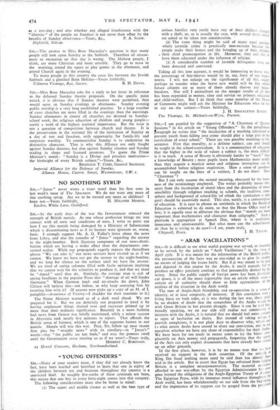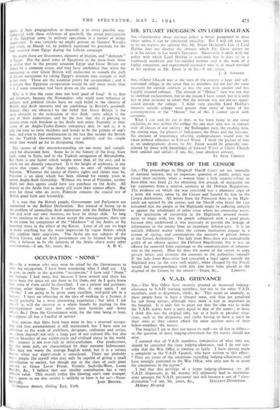ARAB VACILLATIONS "
Sra,—It is difficult to see what useful purpose was served, or intended to be served, by the article on " Arab Vacillations " in the issue of April 25th. If it was meant for the information of the British public. the presentation of the facts was so one-sided as to give its readers no means of judging the issues fairly. But if jt was meant to be read and digested in due course by the Arabs, it could scarcely fail to produce an eject precisely contrary to that presumably desired by the writer. Since the public supply of foreign news has been drasticalb cut down, it is all the more regrettable that an article which wean a certain air of authority should show so little appreciation of the realities of the situation in the Arab world.
The root of Anglo-Arab friendship and co-operation is a sense of identity, or at least congruity, of interests. If this conviction were a living force on both sides, as it was during the last war, there could be no shadow of doubt that the sympathies of the Arabs would be with Great Britain in her present struggle. Since it can be said that• broadly speaking, we on our side still realise our community of interests with the Arabs, it is natural that we should feel some concern at signs of hesitation on theirs. But instead of taking refuge in peevish complaints, it is our plain duty to discover why, where and to what extent Arabs have ceased to share our conviction, and to ask ourselves whether we have any share of responsibility for their doubts- We have been far too ready in recent years to lay the blame com- placently on Axis money and propaganda, forgetting that the aeon of the Axis can only exploit discontents that have already been stirred up on other grounds. Iii the first place, however, it is by no means true that we have received no support in the Arab countries. Of the attitude of King Ibn Saud nothing more need be said than has already ball said in the article. But to assert that Egypt has refrained from helping Britain is a complete misrepresentation. The material assistana afforded to our war-effort by the Egyptian Administration bas even gone beyond the obligations of the Anglo-gyptian Treaty of Alliance- The Egyptian Press, with its immense moral influence throughout the Arab world, has been wholeheartedly on our side from the beginning, and the importance of its support can be gauged from the persistent
efforts of Axis propagandists to discredit it in every possible way. compared with these evidences of goodwill, the actual participation of the Egyptian army in military operations is a matter of minor importance. It was certainly no empty gesture on General Wavell's Part when, on March 1st, he publicly expressed his gratitude for the help received from Egypt during the Libyan campaign. •
No doubt there are discontents, elements of friction, and " demands" in Egypt. But the good sense of Egyptians in the mass leads them to realise that in the present situation Egypt and Great Britain are linked by a common cause, and they have confidence that when the emergency is over Great Britain will endeavour to smooth the path of future association by taking Egypt's interests into account as well as her own. These are the essential points for co-operation ; and it is certain that Egyptian co-operation would be still more ready than it is if some assurance had been given on the second.
Why is it that the same does not hold good of Iraq? It is, first and foremost, because the Nationalists who wield most influence in military and political circles have no such belief in the identity of British and Arab interests and no confidence in Britain's goodwill. Indeed, they are obsessed by the belief that Great Britain is the main obstacle to the realisation of that Arab unity which is the goal of their endeavours, and by the fear that she is plotting to destroy even such freedom as the Arabs now enjoy. Fantastic as their vision of an Anglo-Turko-Zionist conspiracy may be and is, it is only too easy to twist incidents and words to fit the pattern of one's fears, and even to find confirmation in the fact that neither the British nor the Turkish Governments have ever publicly said the simple words that would go far to dissipating them.
The causes of this misunderstanding are too many and compli- cated for discussion here. Some lie in the history of the Iraqi State itself, some in Syria, and in the Turkish occupation of Alexandretta. But there is one factor which weighs more than all the rest, and in which we are directly concerned. It is the height of sophistry, in any article that treats or the Arabs today, to omit all reference to Palestine. Whatever the justice of Zionist rights and claims may be, Palestine is an ulcer which has been allowed for twenty years to poison Anglo-Arab friendship. Without the lever of Palestine, neither Mufti nor Axis agents could have any purchase on the Arabs. All honour to the Arabs that so many still resist their utmost efforts. But even for those who do resist, Palestine remains the crucial test of British good faith and friendship.
It is true that the British people, Government and Parliament are committed to the Balfour Declaration. But instead of facing up to the problem of reconciling Arab aspirations with the Balfour Declara- tion and with our own interests, we have let things slide. So long as we continue to do so, we must accept the consequences; there can be no room for complaints of the " blindness" of the Arabs, or for lecturing them in the ethics of the Koran. Least of all can we hope to make anything but the worst impression by vague threats which only confirm their suspicions. The Arabs are not subjects of the British Crown, and no Arab government can be blamed for placing what it believes to be the interests of the Arabs above every other consideration.—I am, Sir, yours, &c., A. B. C.































 Previous page
Previous page